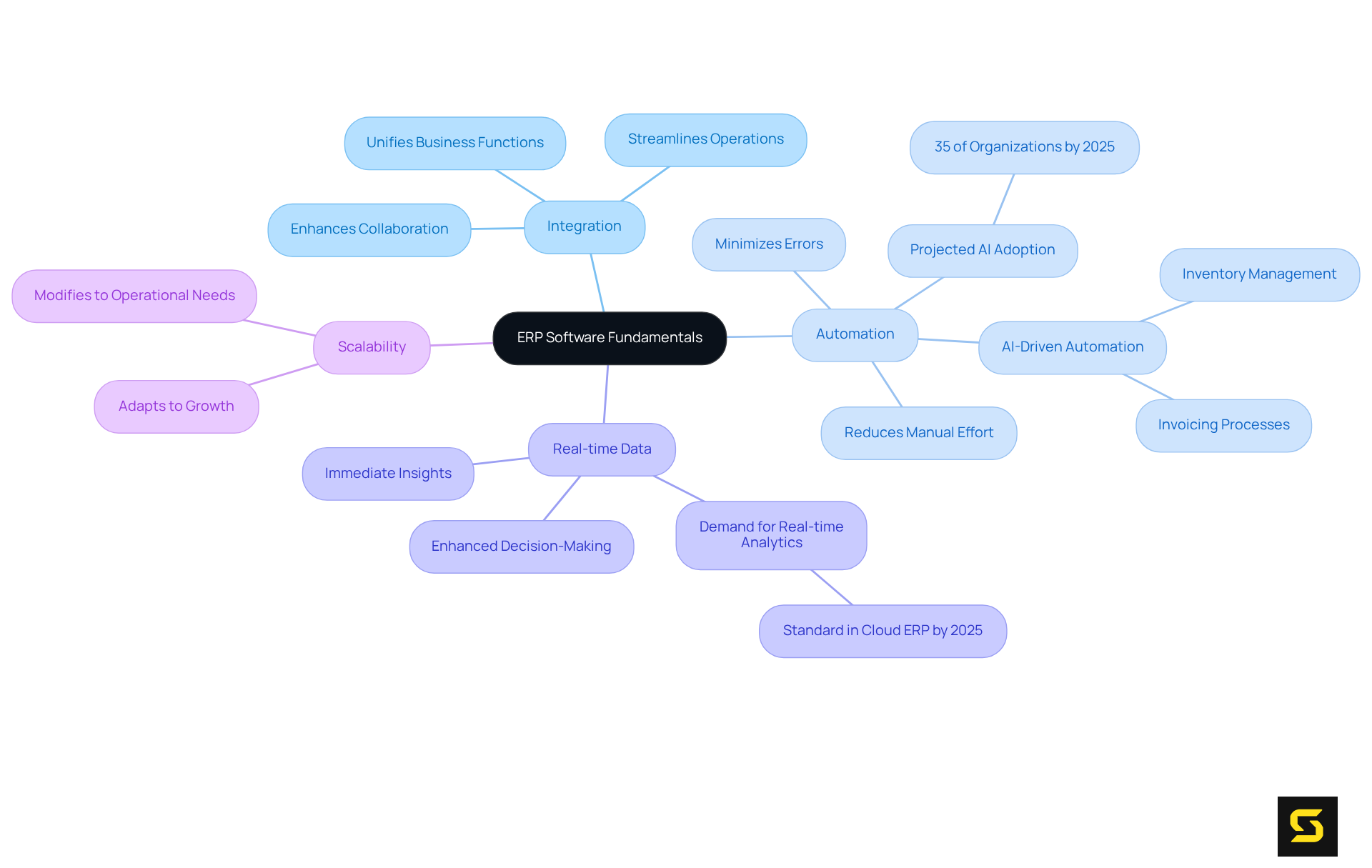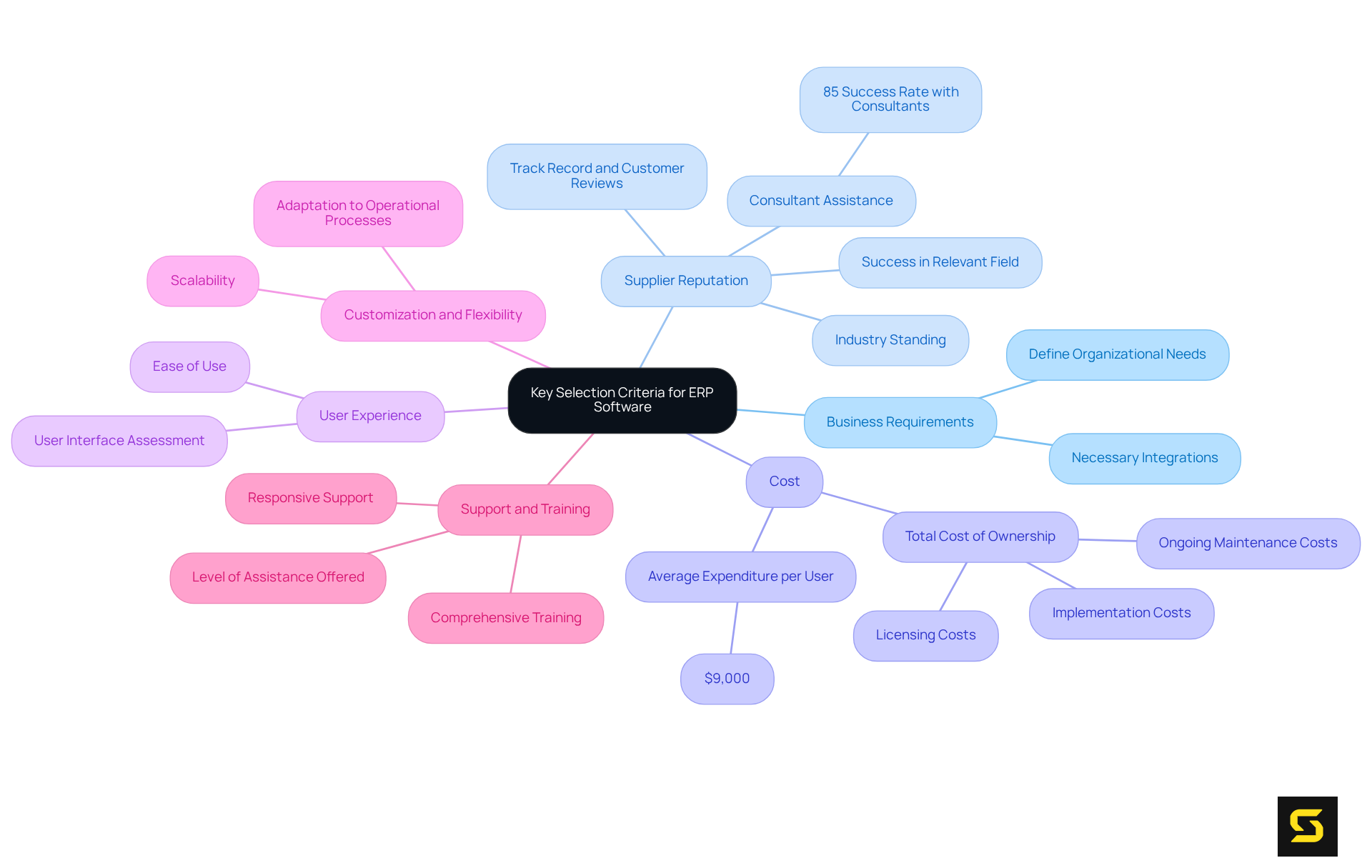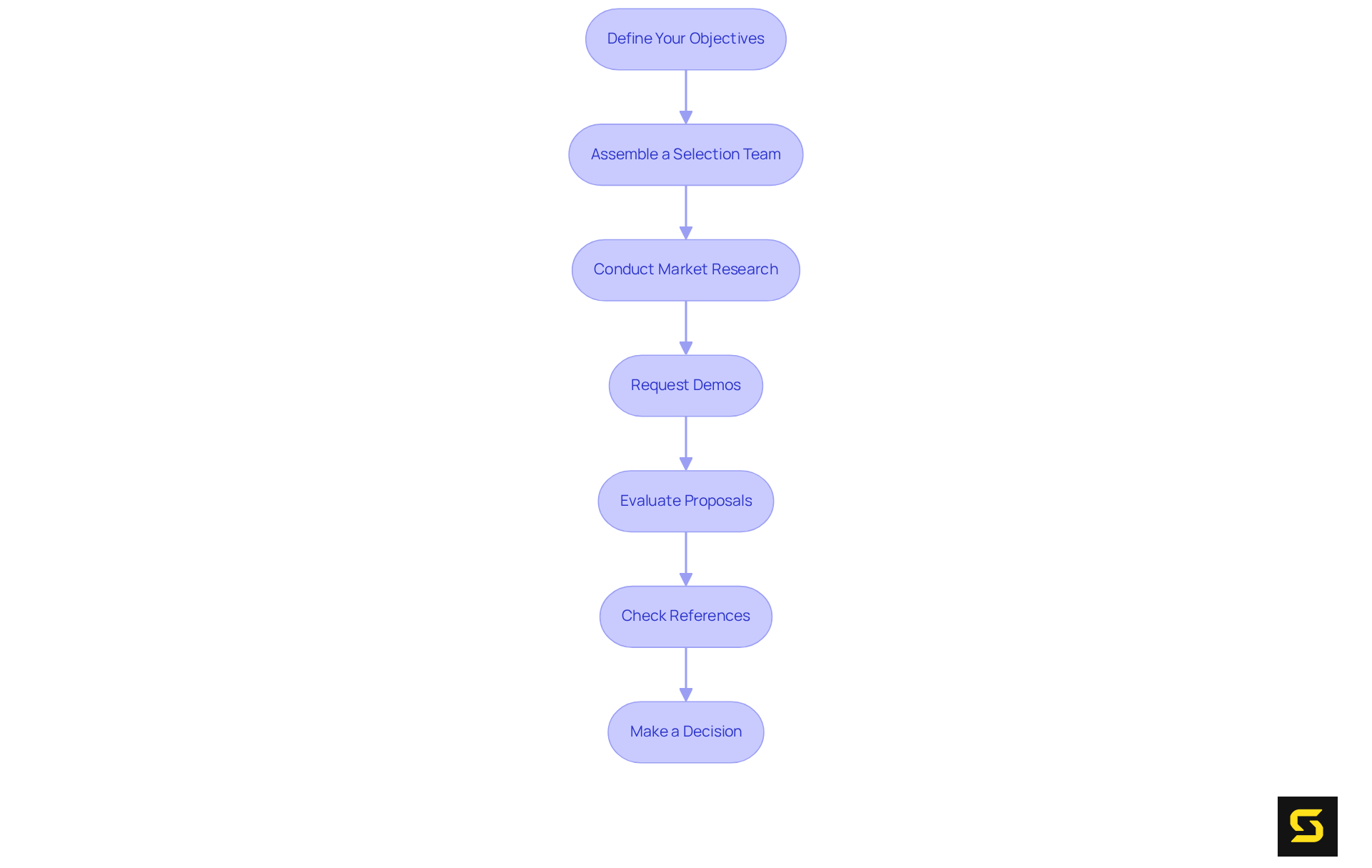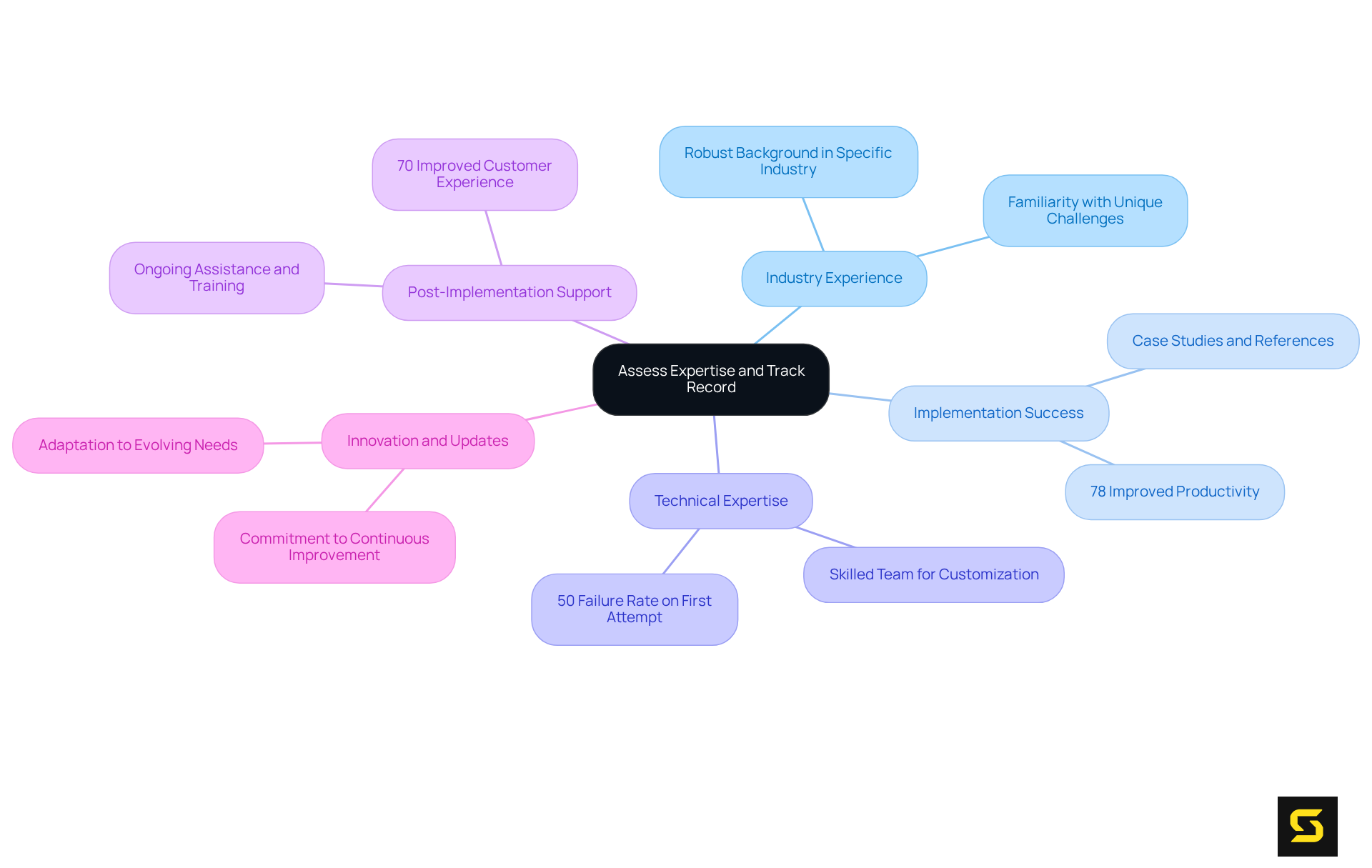Overview
To select the right ERP software development company, organizations must adhere to a structured, step-by-step process. This process includes:
- Defining objectives
- Assembling a selection team
- Conducting market research
- Evaluating proposals
A thorough evaluation of key selection criteria—such as business requirements, supplier reputation, and post-implementation support—is not just advisable; it is crucial for ensuring a successful ERP implementation. By prioritizing these evaluations, organizations can maximize the benefits of their chosen solution, establishing a foundation for long-term success.
Introduction
Selecting the right ERP software development company is a pivotal decision that can significantly shape the future of an organization. In an era where business processes are increasingly complex and the demand for integrated solutions is paramount, understanding the core functionalities of ERP systems is essential.
This guide outlines critical factors to consider when choosing an ERP partner and highlights a step-by-step process organizations can follow to ensure successful implementation.
However, with a vast array of options available, how can businesses navigate these choices and identify the best fit for their unique needs?
Understand ERP Software Fundamentals
An ERP software development company plays a crucial role in providing software that integrates diverse organizational processes into a cohesive framework, facilitating seamless information exchange across departments. The key components of ERP include:
-
Integration: ERP systems unify various business functions such as finance, HR, supply chain, and customer relationship management, enabling efficient data sharing and collaboration. This integration is vital as it allows organizations to streamline operations and enhance overall productivity through an ERP software development company.
-
Automation: By automating routine tasks, an ERP software development company can significantly reduce manual effort and minimize errors in their ERP solutions. AI-driven automation can optimize inventory management and streamline invoicing processes, leading to increased efficiency. Notably, according to IDC, by the end of 2025, 35% of organizations will employ AI-driven digital workers, underscoring the growing importance of automation in ERP processes. Industry leaders assert that automation not only enhances operational accuracy but also liberates employees to concentrate on strategic initiatives.
-
Real-time Data: An ERP software development company offers platforms that provide immediate insights into organizational operations, which is essential for informed decision-making. As we approach 2025, the demand for real-time analytics is projected to rise, with organizations leveraging these insights to enhance forecasting accuracy and operational agility. Gartner anticipates that by 2025, real-time data analytics will become standard in cloud ERP platforms, empowering companies to respond swiftly to market shifts and customer demands.
-
Scalability: As organizations expand, ERP solutions can be scaled to accommodate increasing data volumes and user demands. This adaptability ensures that companies can modify their ERP solutions to meet evolving operational needs without significant disruptions.
Understanding these fundamentals is crucial for articulating your organization's specific needs and expectations from an ERP software development company, which will ultimately position your business for success in a more competitive landscape.

Evaluate Key Selection Criteria
When evaluating ERP software, it is essential to consider the following key selection criteria:
- Business Requirements: Clearly define your organization's needs from an ERP system, including specific functionalities and necessary integrations to ensure alignment with operational goals.
- Supplier Reputation: Investigate the supplier's track record, customer reviews, and industry standing. A strong reputation of an erp software development company often correlates with successful implementations and reliable support, making it a crucial factor in your decision-making process. Interacting with suppliers who have shown success in your field can greatly improve the chances of a seamless transition and efficient performance. As noted by NetSuite, selecting the right ERP partner from an erp software development company can reduce deployment time and ultimately yield benefits. Additionally, statistics show that "85% of organizations report their ERP projects as successful when hiring a software consultant to assist with implementation."
- Cost: Analyze the total cost of ownership, which encompasses licensing, implementation, and ongoing maintenance costs. Understanding these financial implications is vital for long-term budgeting and resource allocation in an erp software development company.
- User Experience: Assess the user interface and overall ease of use. An approach that is intuitive and user-friendly can facilitate quicker adoption and minimize resistance among staff.
- Customization and Flexibility: Determine how easily the ERP can be adapted to suit your unique operational processes. The ability to customize the system is essential for addressing specific operational needs and ensuring scalability as your business grows, which is something that an erp software development company can provide.
- Support and Training: Assess the level of assistance and education offered by the supplier. Comprehensive training and responsive support provided by an erp software development company are critical for ensuring a smooth transition and ongoing operational efficiency. A vendor with a solid reputation for customer service can make a significant difference in the success of your ERP implementation.

Follow a Step-by-Step Selection Process
To select the right ERP software, follow these essential steps:
- Define Your Objectives: Begin by clearly identifying the specific goals you aim to achieve with the ERP system, such as improving efficiency or enhancing reporting capabilities. Involve senior management in this process to ensure alignment with the overall business strategy.
- Assemble a Selection Team: Create a cross-functional team that includes stakeholders from various departments to gather diverse insights and requirements. Engaging representatives from different areas fosters buy-in and addresses unique pain points, as each department contributes valuable perspectives on their needs and future requirements.
- Conduct Market Research: Investigate available ERP solutions offered by an ERP software development company that meets your criteria, focusing on providers with a strong reputation in your industry. Assess their credibility and track record in delivering effective solutions.
- Request Demos: Organize demonstrations with selected suppliers to observe the software in action and evaluate its usability. This practical experience is crucial for understanding how effectively the setup meets your requirements.
- Evaluate Proposals: Carefully review vendor proposals, comparing features, costs, and support options. Ensure that the proposals address your specific requirements and provide a clear picture of the total cost of ownership (TCO), including both initial and ongoing expenses.
- Check References: Engage with current users of the ERP solutions you are considering to gain insights into their experiences and satisfaction levels. This feedback can significantly inform your decision-making process.
- Make a Decision: Based on your evaluations, select the ERP system that best aligns with your business needs and objectives. This decision should reflect a strategic alignment with your long-term goals, ensuring that the chosen solution supports your organization’s growth and operational efficiency.
By adhering to this structured selection process and leveraging the insights of a cross-functional team, organizations can significantly enhance their chances of successful ERP implementation through an ERP software development company and maximize the benefits derived from their investment.

Assess Expertise and Track Record
When assessing an ERP software development company, it is crucial to consider several key factors that can significantly impact your organization's success.
-
Industry Experience: Seek vendors with a robust background in your specific industry. Their familiarity with your unique challenges and requirements will enhance the likelihood of a successful partnership.
-
Implementation Success: Inquire about the supplier's previous implementations, including case studies and references from similar organizations. Notably, 78% of firms reported improvements in productivity following ERP solutions, underscoring the necessity of selecting an ERP software development company with a proven track record.
-
Technical Expertise: Verify that the provider possesses a skilled team adept at customizing and integrating the ERP solution with your existing processes. It is critical to acknowledge that 50% of ERP implementations fail on the first attempt due to various challenges, which underscores the importance of partnering with an ERP software development company that possesses technical proficiency.
-
Post-Implementation Support: Evaluate the extent of ongoing assistance and training the provider offers once the solution is operational. This support is vital for long-term success. For instance, 70% of businesses noted improvements in customer experience post-ERP implementation, attributable to effective training and support.
-
Innovation and Updates: Assess the vendor's commitment to continuous improvement and updates. This ensures that the ERP software development company helps your ERP system remain relevant and effective over time, adapting to your evolving needs.

Conclusion
Selecting the right ERP software development company is a pivotal decision that can significantly impact an organization’s operational efficiency and overall success. By understanding the foundational elements of ERP systems—such as integration, automation, real-time data, and scalability—businesses can articulate their specific needs and expectations, ensuring they choose a partner that aligns with their strategic goals.
This article outlines a comprehensive approach to selecting an ERP software provider, emphasizing the importance of:
- Defining business requirements
- Assessing supplier reputation
- Evaluating costs
- Ensuring user-friendliness
It highlights a structured step-by-step selection process that includes:
- Assembling a cross-functional team
- Conducting market research
- Requesting demos
- Checking references
Each of these steps is designed to mitigate risks and enhance the likelihood of a successful ERP implementation.
Ultimately, the significance of partnering with an experienced ERP software development company cannot be overstated. Organizations are encouraged to prioritize industry expertise, implementation success, and ongoing support when making their selection. By taking these considerations seriously, businesses can not only streamline their operations but also position themselves for future growth and adaptability in an ever-evolving market landscape. Embracing this strategic approach empowers organizations to maximize the benefits of their ERP investment and drive sustained success.
Frequently Asked Questions
What is the role of an ERP software development company?
An ERP software development company provides software that integrates various organizational processes into a cohesive framework, facilitating seamless information exchange across departments.
What are the key components of ERP software?
The key components of ERP software include integration, automation, real-time data, and scalability.
How does integration function within ERP systems?
Integration in ERP systems unifies various business functions such as finance, HR, supply chain, and customer relationship management, enabling efficient data sharing and collaboration.
What benefits does automation provide in ERP solutions?
Automation reduces manual effort and minimizes errors in ERP solutions, optimizing processes like inventory management and invoicing, which leads to increased efficiency.
What is the significance of real-time data in ERP systems?
Real-time data provides immediate insights into organizational operations, which is essential for informed decision-making and enhances forecasting accuracy and operational agility.
How is the demand for real-time analytics expected to change by 2025?
By 2025, the demand for real-time analytics is projected to rise, with organizations leveraging these insights to respond swiftly to market shifts and customer demands, making real-time data analytics standard in cloud ERP platforms.
What does scalability mean in the context of ERP solutions?
Scalability refers to the ability of ERP solutions to accommodate increasing data volumes and user demands as organizations expand, allowing for modifications to meet evolving operational needs without significant disruptions.
Why is understanding ERP fundamentals important for organizations?
Understanding ERP fundamentals is crucial for articulating specific needs and expectations from an ERP software development company, positioning the business for success in a competitive landscape.





